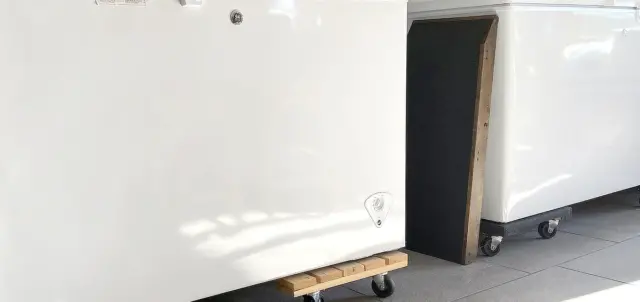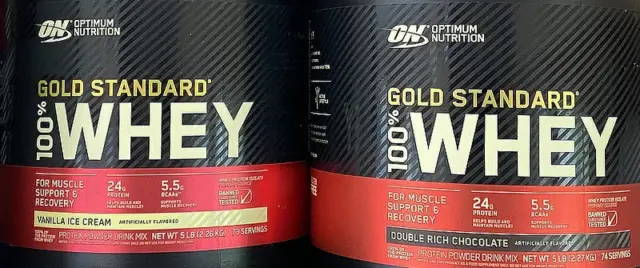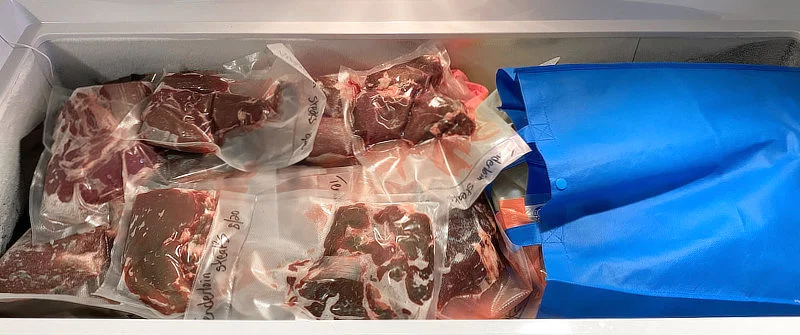Deep Chest Freezer Full Of Meat
A deep freezer full of meat. A chest freezer. It’s a sensible thing to do. Protein preparedness. Here’s what I do, the meats that I keep, and what you might consider doing yourself.
Two of my three chest freezers are filled with vacuum sealed meat. Primarily beef, chicken, and pork. You might say that it’s my long term food storage of protein (which I regularly consume and rotate).
The third deep freezer is filled with various vegetables from the garden (including lots of vacuum sealed sliced bell peppers for stir fry – yum!).
Lots of the meat has been purchased on sale, which is another advantage to having a deep chest freezer.
Meat Chest Freezer Protein

From a preparedness standpoint while talking about building an extra quantity of food storage..
Foods loaded with carbohydrates can be relatively inexpensive, quick and easy. However it is very important to include adequate protein among your overall long term food storage. The best way for that, in my opinion, is meat.
While you can ‘survive’ without eating meat, your protein intake will be lower. Alternatives to meat protein include eggs, wheat flour, soybeans, beans, corn, and other some veggies. But their protein content is comparatively low.
Protein is a macro nutrient necessary for the proper growth and function of the human body. Among other things, proteins are also the building blocks for muscles. Therefore we all need protein – in varying amounts – to live a healthy life.
Proteins are part of every cell, tissue, and organ in our bodies.
How Much Protein You Need
I also stock up on the following protein supplement, and use it on a regular basis too. It has 24 grams of protein per serving.
Optimum Nutrition – Gold Standard
(amzn)

The recommended daily protein intake for an average sedentary adult is 0.8 grams per kilogram of body weight. For example, a person weighing 165 pounds, or 75 kilograms, should consume 60 grams of protein daily.
People who exercise regularly have higher protein needs, about 1.1–1.5 grams per kilogram of body weight (up to twice as much as a sedentary adult).
The Food and Drug Administration suggests that most US adults require around 50 grams of protein daily, but this total depends on age, sex, health status, and activity levels.
Mayo Clinic 1 – Mayo Clinic 2 – Healthline
Most Popular Chest Freezer on Amzn:
7.0 cubic feet
When talking about food for a deep freezer or chest freezer, I believe your best value for that space is to fill it with meat.
Yes, I know that if the power goes out for long, you’re going to be in trouble… A fairly full chest freezer will likely be fine up to ~ 48 hours if you don’t open it. A generator will keep a chest freezer cold if you run it for an hour – several times a day. Long term SHTF power outage without a generator and fuel — yes you’re going to lose whatever you can’t consume or preserve another way (e.g. emergency canning project).
But other than that, freezer storage is a great way to keep meat protein.
Meat Chest Freezer

Most typical meats have between 25 – 30 grams of protein in 100 grams (about 1/4 pound, or 4 ounces). So it doesn’t matter too much which specific meats that you keep.
Over time, I filled both meat freezers. It did take some $$$, but I feel that it’s well worth it. There’s peace-of-mind, and the price of foods are only going to continue to rise.
I have one deep freezer filled with beef. Probably 3/4 are cuts of steak (with some roasts too), and 1/4 is ground beef.
The other meat freezer is filled with about 1/3 dark meat chicken (leg quarters, thighs, and drumsticks), 1/3 breast meat chicken, and 1/3 pork (mostly tenderloins).
Simply consuming 8 ounces (half a pound) of meat will provide nearly exactly the recommended amount of daily protein for a sedentary adult (according to mainstream RDA sources). A 12-14 ounce steak might yield about 80 grams of protein – keeping up with requirements for a normally active adult. I’m getting hungry typing this :=)
Packaging Meat For The Chest Freezer
This is important for optimal shelf life. I seal all meats in vacuum sealed bags using a vacuum sealer (e.g. FoodSaver). It makes a HUGE difference in longevity (shelf life) for meat in the chest freezer. It prevents ice crystals from forming over time, and prevents oxidation.
I’ve been doing this for years. My experience is that meat in the chest freezer remains optimal for up to 2 years (Ground meat approximately 1 year). After this, you may begin to notice (although it doesn’t suddenly go bad).
How I Organize My Chest Freezers
Canned Food That’s Best For Survival Storage

